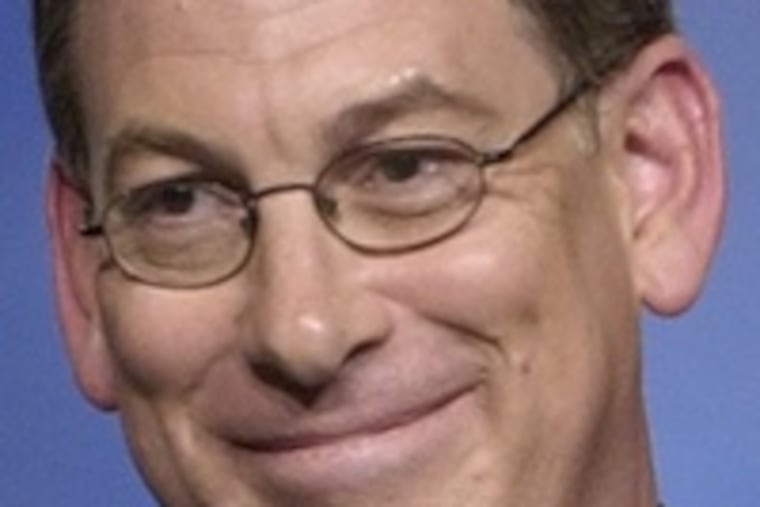Katz multiplies the post-primary permutations
The possibility of a post-primary Katz candidacy raises some intriguing new scenarios in the fall race for mayor.

With the check of a box on a sheet of paper, Sam Katz provided a reminder that the Philadelphia mayor's race could change dramatically even after the May 15 primary.
Katz's last-minute move to shed his Republican stripes and register as a "non-affiliated" voter sets him up to pursue his fourth campaign for mayor this fall as an independent - if he chooses to run.
And regardless of what Katz decides, or whether another independent candidate emerges, the Republicans could still decide after the primary to come up with someone besides their nominee-apparent, Al Taubenberger.
These scenarios are most likely to come into play, political insiders say, if front-runner Tom Knox wins the Democratic primary. The theory is that enough Democratic leaders and voters might be upset by a Knox victory in the primary - Knox is running against the party establishment - that they would try to stop him in the fall.
No one other than the Democratic nominee has been elected mayor of Philadelphia in more than 50 years.
In a brief interview yesterday, Katz, 57, said that after The Inquirer reported online Monday that he'd made the switch to independent, he has been deluged with calls and e-mails from friends and supporters wanting to know his plans.
But he declined further comment, pointing only to his remark Monday that nobody should "read too much into it."
City and state election offices say Katz has set up no political committee to raise funds. And several campaign donors and advisers who have worked with him in the past say Katz has not reached out to them - and that in fact they, too, were surprised to learn of his party switch.
Lawyer David Girard-diCarlo, a Republican fund-raiser who has supported Katz's prior efforts, said Katz's next moves would likely hinge on the outcome of the Democratic primary. "Anyone who wins the primary in Philadelphia will be a formidable candidate. [But] it's one thing if it's a squeaker; it's another thing if they blow them out."
Inquirer publisher Brian P. Tierney, Katz's 2003 campaign co-chair and a major donor, said he hasn't spoken to Katz in a few months. Any groundswell of support wouldn't include him, Tierney said, adding that with the newspaper role he assumed last summer, he is no longer politically active.
For an independent candidacy, the requirement to gather nominating signatures is not onerous. According to the nonpartisan Committee of Seventy, the magic number is only 1,967, and any registered Philadelphia voter may sign, regardless of party registration.
The filing deadline is Aug. 1, giving Katz or other would-be candidates plenty of time to consider their options.
Katz has made no mention of his plans in the mayoral-campaign blog he writes for Philadelphia Magazine. Larry Platt, the magazine's editor, said yesterday that Katz could keep blogging as long as he's not a candidate.
In 2003, the magazine endorsed Katz over Mayor Street, a Democrat. On Monday, it announced it would back Michael Nutter in this year's Democratic primary.
The Inquirer has not yet endorsed a candidate.
Katz's previous mayoral runs were in 1991 and in 1999, when he lost narrowly to John Street. The mayor defeated him again in 2003, by a wider margin.
Adding to the latest intrigue around Katz are the two campaign signs that were on his front lawn yesterday - "Michael Nutter for Mayor."
While Katz has not endorsed any Democratic candidate, his 18-year-old son, Ben, volunteers for Nutter's campaign.
Katz has been a Nutter fan in the past, though. He is the one who, amid his 2003 mayoral campaign, initially recommended Nutter be appointed chairman of the Pennsylvania Convention Center board, a post Nutter resigned only last week.
If Katz decides to run, Taubenberger said it would not be as a Republican - Taubenberger has no intention of withdrawing. After talking with Republican Party leader Michael P. Meehan Monday night, Taubenberger said, "He has given me every assurance to know that I will be the nominee of the party after May 15." If Taubenberger were to step down, the Republican City Committee would have the power to name a substitute.
And the substitute could be any Philadelphia voter. Which means Katz would be eligible even though he's no longer a Republican. So, too, would the four candidates who come up short in the five-man Democratic primary.
"The Republican Party may substitute-nominate a candidate who ran in and lost the Democratic primary for the same office," said Cathy Ennis, a spokeswoman for the Department of State in Harrisburg.